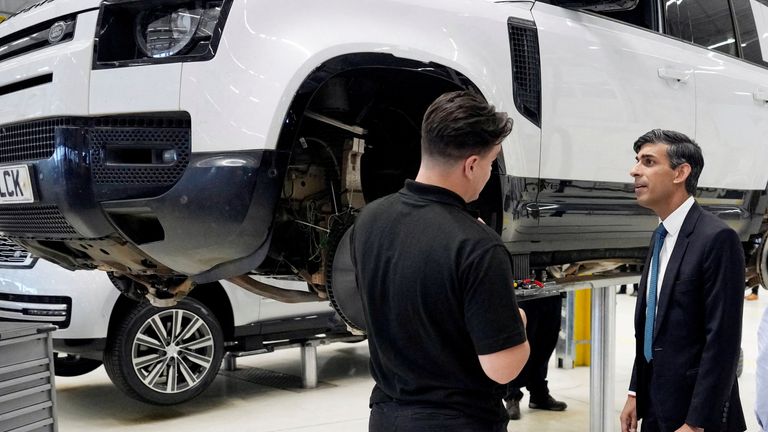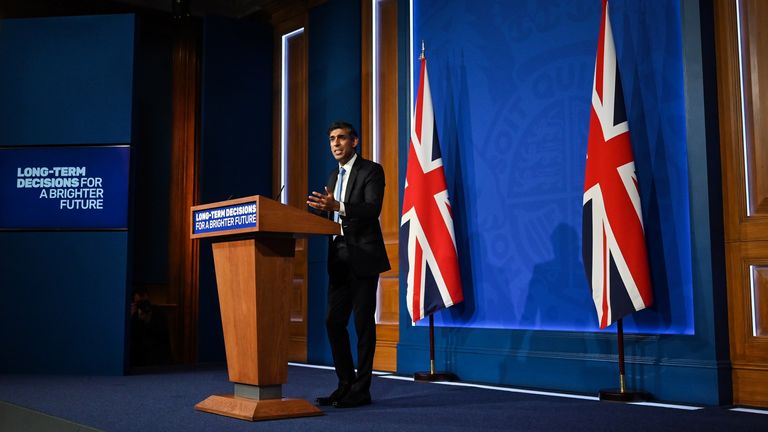PM's U-turns weren't really about net zero - but playing politics with climate change is a big risk
Whatever Rishi Sunak says, the details of his changes in climate policy suggest he is thinking about politics, not the environment. In a year which is currently on course to be the warmest in human history, that's a pretty big risk to take.
Wednesday 20 September 2023 20:49, UK
The prime minister denied that today's net zero intervention was about politics.
He insisted it was in no way an attempt to turn net zero into a wedge issue to win votes from those struggling to afford heating and transport costs.
But looking at the details of what Rishi Sunak actually announced, it's difficult to see it any other way.
PM reveals major U-turns on net zero policy - politics latest
Take the main premise of his statement: that current targets were "forcing" families to spend thousands of pounds upgrading homes or buying more expensive electric cars.
This would indeed be unfair, and impossible to deliver.
His logical solution: scrap the target.
But targets don't deliver net zero, policies do.
It's why bodies like the Committee on Climate Change (which makes recommendations to governments on how to deliver their net zero targets) have been saying for years, in a series of increasingly desperate reports, that credible and detailed policies need to be developed to meet these targets in a fair way.
Policies, for example, that can spread the cost of upgrading a home's insulation or heat pump installation across the future life of the home either via a mortgage, bond or stamp duty adjustment that would pass the costs (offset by savings) on to future owners.
But so far, we haven't seen any policies put forward that would deliver on these targets fairly, or rapidly enough.
He also stressed how there had been a lack of "consent" from the British people.
The suggestion is that net zero has somehow been imposed on us all.
However, the Climate Change Act was passed in 2008 with cross-party support, as was the 2050 net zero target (2019) and an interim target of 57% cuts by 2030 (passed in 2021).
A period in which there have been four general elections.
Building consensus on expensive, disruptive policies that involved remodelling homes and getting new cars probably needs more than just parliamentary support, however.
Click to subscribe to the Sky News Daily wherever you get your podcasts
It's why the Committee on Climate Change and the review of net zero commissioned by Liz Truss last year, recommended "citizens assemblies" to help grow consensus and learn what unintended consequences net zero policies might have.
But none of those suggestions were mentioned today. Merely that "change" was necessary.
And that change appears to be effectively what had been leaked to the press. A rowing back on a few key net zero targets.
The implications of that for businesses, which were investing based on those targets, were immediately pointed out today by the likes of like Ford, eON and Stellantis.
The economic benefits of net zero for jobs and growth were explained by my Sky colleague Ed Conway.
And it's been well established that delaying net zero ambition now, will only make it much more expensive in five, 10, or 25 years' time.
Not to mention the increasing, and increasingly volatile, costs to consumers of remaining dependent on oil, gas, petrol and diesel.
Read more:
How will PM's changes affect me?
The more Sunak wavers on net zero, the higher the costs will be
Braverman: 'Bankrupting Britons won't save planet'
Be the first to get Breaking News
Install the Sky News app for free


The prime minister made it very clear that he remains committed to hitting the long-term target of net zero by 2050.
But it seems reasonable to conclude his intervention wasn't really about getting there.
If the plan is to politicise net zero in the run-up to a general election, it could help force a long overdue public discussion about the fairest way of building a low-carbon economy.
Alternatively, it risks polarising opinion and delaying any progress on carbon reductions for years.
In a year which is currently on course to be the warmest in human history, that's a pretty big risk to take.







